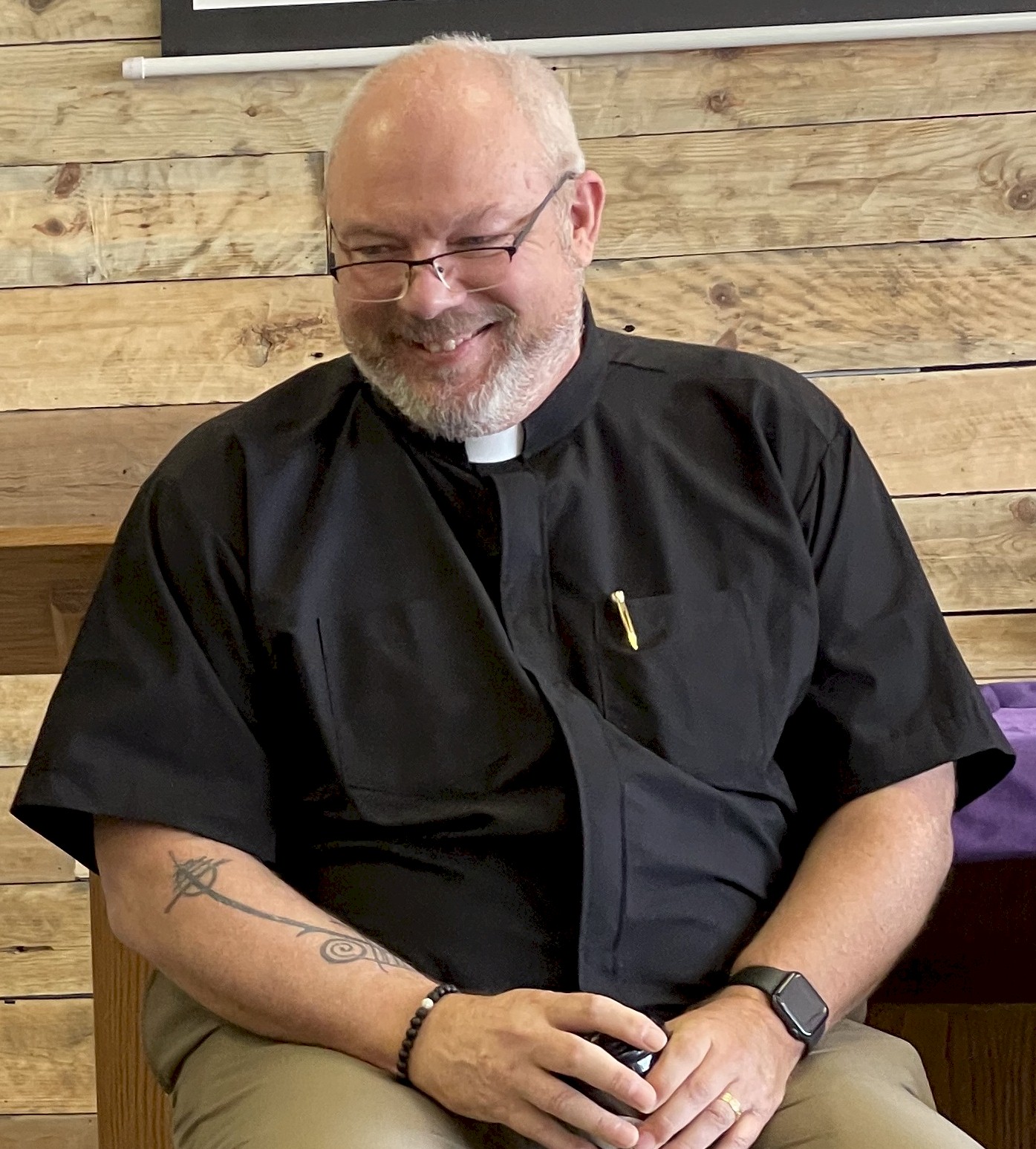Fr. Kenn Nelan created the images in this post. The images in this post may NOT be reproduced or used without the author’s express written permission.
In the tapestry of life, we sometimes find ourselves in situations where we are wronged, hurt, or betrayed. In these moments, we are faced with a choice – to hold onto the pain or let it go. When searching for answers, we are often told the best course of action is to forgive and forget. However, forgetting can lead us into further discomfort or even darker passages. I invite you to think a bit differently about this topic. I invite you NOT to forget. The concept of ‘forgiving but not forgetting’ is a delicate balance that allows us to navigate these difficult waters.
Forgiveness is often misunderstood as a sign of weakness or surrender. However, it is far from that. Forgiveness is a conscious decision, a powerful act of resilience and strength that allows us to release resentment. It is about freeing ourselves from bitterness and opening our hearts to healing and peace.

Forgiveness stands as a beacon of hope, offering solace to wounded hearts and fractured souls. It is a transformative act capable of unraveling the knots of bitterness and resentment that bind us to our past. Yet, amidst the myriad interpretations of forgiveness, there exists a subtle misconception – that in order to forgive, one must forget entirely. But is it necessary to forget in order to truly forgive?
No! Forgetting is not a prerequisite for forgiveness. Remembering the past can serve as a valuable lesson, a reminder of our growth and resilience. It’s about learning from our experiences, not erasing them.
As we explore forgiveness within the spiritual and mental wellness dimensions, we must dispel this notion of ‘forgiving but not forgetting,’ and unravel the delicate threads that bind forgiveness and memory together. In understanding the intricate interplay between these two facets of the human experience, we uncover profound insights into the nature of healing and resilience. Guided by the light of remembrance but tempered by the wisdom of experience, we dive into the depths of forgiveness and understand how it can lead us toward personal growth and emotional freedom.
Understanding Forgiveness
Forgiveness is a multi-dimensional concept that transcends mere absolution of wrongdoing. It is a profound self-liberation and empowerment, allowing individuals to reclaim agency over their emotional well-being. At its essence, forgiveness involves a conscious decision to release the grip of resentment and anger, fostering inner peace and emotional healing. It is a form of self-care.
However, understanding forgiveness goes beyond surface-level definitions. It requires a deep dive into the intricate layers of human emotion and psychology. Forgiveness is not synonymous with condoning or excusing the actions of others; rather, it is a declaration of independence from the emotional shackles that bind us to past hurts.
Forgiveness is often heralded as a cornerstone of personal growth and transformation in mental wellness. Research has shown1https://www.mayoclinic.org/healthy-lifestyle/adult-health/in-depth/forgiveness/art-20047692 2https://www.hopkinsmedicine.org/health/wellness-and-prevention/forgiveness-your-health-depends-on-it that harboring resentment3https://www.beliefnet.com/wellness/health/4-ways-resentment-affects-your-health.aspx and holding onto grudges can have detrimental effects4https://psychcentral.com/health/tips-to-stop-holding-a-grudge on both physical and mental health. By choosing to forgive, individuals can alleviate the burden of stress and negativity, leading to improved overall well-being.

Moreover, forgiveness is a dynamic process that unfolds over time. It requires introspection, empathy, and a willingness to let go of the need for retribution. It is not a one-time event but a continuous journey towards greater self-awareness and compassion.
In the spiritual dimension, forgiveness is transcendent, connecting individuals to a higher sense of purpose and meaning. Many spiritual traditions emphasize the importance of forgiveness as a pathway to spiritual enlightenment and inner peace. By relinquishing grievances and embracing forgiveness, individuals can cultivate a deeper connection to themselves and others.
Understanding forgiveness requires a holistic approach that considers its psychological, emotional, and spiritual dimensions. It is a process of self-discovery and transformation guided by compassion, empathy, and acceptance.
The Role of Memory
Memory serves as the cornerstone of human experience, shaping our perceptions, beliefs, and behaviors. In the context of forgiveness, memory plays a pivotal role in shaping our understanding of past hurts and informing our decision to forgive.
Contrary to the notion that forgiveness necessitates forgetting, memory serves as a faithful recorder of our lived experiences. It bears witness to our pain and suffering, preserving the emotional imprints of past transgressions. Rather than erasing these memories, forgiveness involves a nuanced relationship with them – a recognition of their presence without allowing them to dictate our future.
Memory serves as a teacher, offering valuable insights into the dynamics of relationships and the intricacies of human behavior. By remembering past hurts, we gain clarity about our boundaries, values, and expectations. We learn to discern patterns of behavior that may lead to further harm and empower ourselves to make informed choices in our interactions with others.
Moreover, memory serves as a source of empathy and understanding. When we remember the pain we’ve experienced, we cultivate compassion for ourselves and others who may have also suffered. Our shared humanity becomes evident as we recognize the universal nature of human frailty and the capacity for growth and redemption.
However, memory is not without its challenges. Remembering past hurts can evoke intense emotions, triggering anger, resentment, or sadness. It requires courage and resilience to confront these emotions and choose forgiveness in spite of them. Yet, it is through this process of confronting and processing our memories that true healing and transformation can occur.
Ultimately, the role of memory in forgiveness is complex and multifaceted. It serves as a reminder of our capacity for resilience and growth and a testament to the human spirit’s enduring quest for healing and redemption. By embracing our memories with compassion and understanding, we can navigate the path of forgiveness with grace and wisdom, ultimately finding peace within ourselves and our relationships.
Importance of Remembering
Remembering past hurts serves a crucial purpose in forgiveness and personal growth. It allows us to acknowledge the reality of our experiences and validate the accompanying emotions. By remembering, we honor the truth of our pain and affirm our right to feel hurt or betrayed.
Moreover, remembering past hurts serves as a protective measure, enabling us to set healthy boundaries in our relationships. It provides valuable insights into the behaviors and dynamics that led to the initial hurt, empowering us to recognize and address red flags in future interactions. By remembering, we arm ourselves with the knowledge and awareness to safeguard our emotional well-being.
Additionally, remembering past hurts fosters empathy and compassion for ourselves and others. As we reflect on our experiences of pain and betrayal, we develop a deeper understanding of the human condition. We recognize that we are not alone in our struggles and that others may be grappling with their wounds. This recognition cultivates empathy and strengthens our connections with others, fostering a sense of solidarity and shared humanity.
In essence, the importance of remembering lies in its capacity to validate our experiences, protect our boundaries, and cultivate empathy. By embracing the memories of our past hurts with courage and compassion, we pave the way for healing and growth, both individually and collectively.
Learning from the Experience

Every painful experience offers an opportunity for growth and self-discovery. We can glean invaluable insights into ourselves and our relationships by embracing the lessons embedded in our past hurts.
One key lesson we can learn from past hurts is the importance of self-awareness and introspection. By examining the events that led to the hurt and our reactions to them, we gain clarity about our values, boundaries, and needs. We also become more attuned to our emotions and triggers, enabling us to navigate future challenges with greater resilience and grace.
Moreover, past hurts can serve as catalysts for personal transformation. They compel us to confront our limitations, biases, and preconceived notions. In doing so, we open ourselves to new perspectives and possibilities, fostering growth and evolution.
Additionally, past hurts can deepen our capacity for empathy and compassion. Through our own experiences of pain and suffering, we develop a heightened sensitivity to the struggles of others. We become more attuned to the nuances of human emotion and more willing to extend understanding and support to those in need.
Ultimately, learning from past hurts is about embracing the wisdom that arises from adversity. It is about recognizing the transformative power of pain and using it as fuel for personal growth and healing. By approaching our past hurts with openness and curiosity, we can extract meaning and purpose from even the most challenging of experiences, ultimately emerging stronger, wiser, and more resilient.
Setting Boundaries
Forgiving but not forgetting also involves setting and maintaining healthy boundaries in relationships. Boundaries serve as safeguards for our emotional well-being, ensuring that we are treated with respect and dignity. By establishing clear boundaries, we communicate our needs and expectations to others, reducing the likelihood of future harm.
Setting boundaries begins with self-awareness and self-respect. It requires us to tune into our emotions and recognize when our boundaries have been crossed. Whether it’s a breach of trust, a violation of personal space, or a disregard for our feelings, it’s important to assert ourselves and communicate our discomfort clearly and assertively.
Moreover, setting boundaries is not a one-time event but an ongoing process of self-care and self-advocacy. It requires us to be consistent and firm in our interactions with others, even in the face of resistance or pushback. We cultivate a sense of empowerment and agency in our relationships by prioritizing our well-being and honoring our boundaries.
Ultimately, setting boundaries is an act of self-love and self-respect. It allows us to create space for authentic connection and mutual respect while protecting ourselves from harm. By embracing the power of boundaries, we can navigate the complexities of forgiveness with confidence and grace, ensuring that our relationships are built on a foundation of mutual trust and understanding.
Moving Forward
Forgiving but not forgetting is also about moving forward with our lives, liberated from the shackles of resentment and bitterness. It’s about reclaiming our power and agency and embracing the possibility of a brighter future.
In the journey of forgiveness, it’s okay to remember without dwelling and to forgive without forgetting. ~ Fr. Kenn Nelan

Moving forward begins with a commitment to self-care and self-reflection. It’s about nurturing ourselves emotionally, physically, and spiritually and prioritizing our well-being. This may involve engaging in activities that bring us joy and fulfillment, surrounding ourselves with supportive and uplifting people, and practicing self-compassion and forgiveness.
Moreover, moving forward requires us to cultivate a mindset of resilience and optimism. It’s about reframing our past hurts as opportunities for growth and transformation rather than obstacles to be overcome. By adopting a growth-oriented mindset, we can turn our pain into wisdom and our scars into sources of strength.
Moving forward involves letting go of the need for closure or validation from others. It’s about finding peace within ourselves and releasing the need to seek external validation or approval. By trusting in our inherent worth and value, we can chart our path forward, free from the constraints of past hurts.
Ultimately, moving forward is a deeply personal journey that unfolds at its own pace. It requires patience, courage, and resilience, but it also offers the promise of healing, growth, and renewal. By embracing the process of forgiveness and letting go of the past, we open ourselves up to the endless possibilities that await us in the future.
Notes & Citations
- 1
- 2
- 3
- 4

